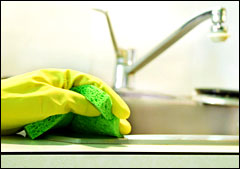Greetings,
I recently was infected with MRSA. It got better. As part of my treatment I’m supposed to use bleach in my laundry and around the house to help kill the bacteria. While I’m brunette, I feel like the stereotypical blonde about bleach. What are the environmental impacts of this chemical?
Thanks,
Emily
Indiana
Editor’s Note: Oh, how Umbra would love to answer this question — but she’s been kidnapped! Please donate to Grist by 11:59 p.m. Pacific on Dec. 11, 2007, to secure her safety. The sooner we see 2,000 gifts of any size (yes, even $1!), the sooner you’ll get the great green advice you’ve come to know and love.
Editor’s update: Umbra has been released, thanks to your generosity, and was able to pen an answer to this query.
Dearest Emily,
My condolences. Methicillin-resistant Staphylococcus aureus, or staph infection resistant to a common class of antibiotic (beta-lactams, if you must know), is becoming increasingly common in the general population. It used to be limited to hospitals and people with depressed immune systems; now one can pick up what’s called “community-associated” MRSA at schools, summer camps, and Twister games.

A photo from the Staph retreat.
Photo: iStockphoto
Staph bacteria live on and in us and occasionally aggrieve us with a skin infection, causing a pustulant boil. (In fact, I answered this question so that I could use the phrase “pustulant boil,” a freedom denied me in captivity.) An MRSA infection is treatable, but in order to reduce recurrence and prevent transmission to others, the MRSA sufferer should practice excellent hygiene, and apparently disinfect the home.
Leading us to bleach. For an environmentalist, bleach use should be minimal and reserved for occasions of necessary disinfection. MRSA is such an occasion, so Emily, bleach away as directed.
However: When considering chlorine bleach for other household uses, remember that bleach is dangerous to your lungs and mucus membranes. The production of bleach results in production of dioxins. As you use the bleach, it may produce trihalomethanes, linked to cancer, and adsorbable organic halides, which are harmful to marine organisms. For these reasons, use bleach only when disinfection is warranted. If you only seek whiter, grime-free, shiny surfaces, our old friends vinegar, soap, and baking soda will do you proud.
Pimply,
Umbra


